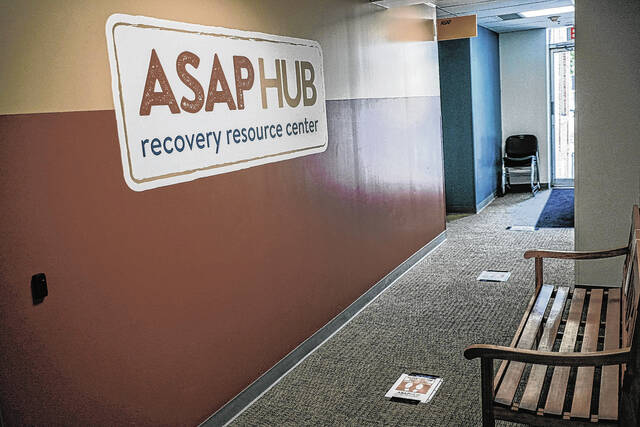
Mike Wolanin | The Republic A view of the hallway leading to the entrance of the Alliance for Substance Abuse Progress Bartholomew County Hub in Columbus, Ind., Monday, June 15, 2020.
Mike Wolanin | The Republic A view of the hallway leading to the entrance of the Alliance for Substance Abuse Progress Bartholomew County Hub in Columbus, Ind., Monday, June 15, 2020.
COLUMBUS, Ind. — The Alliance for Substance Abuse Progress (ASAP) is re-evaluating its strategy and efforts to combat the community’s decades-long drug crisis while grappling with a historic rise in overdose deaths fueled by a more dangerous drug supply and the pandemic.
The re-evaluation is largely in response to the fast-evolving drug crisis, including the growing prevalence of fentanyl in the Columbus area. ASAP officials and its board are discussing how to expand the organization’s role since forming in 2017 as a community-wide response to address substance use disorder.
Fentanyl is a synthetic opioid that is more potent than heroin but much cheaper to produce and distribute and is quickly becoming the “primary fatal drug in drug overdoses,” local officials say. The drug also is finding its way into other drugs like methamphetamine, cocaine, marijuana and counterfeit prescription medications, making them cheaper, more addictive and deadlier.
Officials fear that a continued influx of fentanyl in the community will continue to accelerate a crisis that has killed at least 156 Bartholomew County residents since 2015, including a record 33 last year.
But despite the rise in overdose deaths, the ASAP Hub, located in the Doug Otto Center at 1531 13th St., has not seen a similar increase in foot traffic, “which has really led us to re-evaluate our strategy,” said ASAP Executive Director Sherri Jewett.
“Things have changed in the last five years, and the drugs of choice have changed,” she said.
“We were established to be a support for people in crisis,” Jewett said. “(We’re) starting to expand that role and purpose to look not just at people who are in crisis, but people who are on that path. People who haven’t lost everything, but yet they’re increasing their substance use. Providing them information and providing them support may be our next direction.”
Some of the new efforts that ASAP is planning or considering include adult education and prevention campaigns targeting recreational drug users who are not yet experiencing a crisis. Also being considered is expanding emergency harm-reduction measures, including the possibility of making fentanyl test strips available to the public similar to naloxone, a nasal spray that can temporarily reverse an opioid overdose.
Fentanyl test strips can test whether drugs contain the synthetic opioid. Some harm reduction programs use the strips to warn drug users of the presence of fentanyl, as many people are unaware that they are using the drug.
Unintentional use of fentanyl is believed to be a major driver of overdose deaths.
For the complete story, see Sunday’s Republic.




